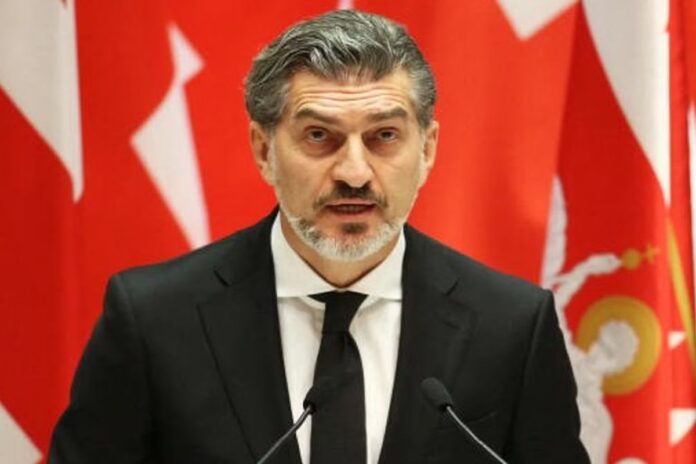Mikheil Kavelashvili was sworn in as Georgia’s new president amidst a growing political crisis, with tensions escalating following the suspension of the country’s European Union (EU) accession talks. On Sunday, Mikheil Kavelashvili, a former professional soccer player, took office in a move that sparked protests and accusations of a questionable election process. Kavelashvili, known for his strong pro-Russian stance, now faces significant opposition from the outgoing President, Salome Zourabichvili, who has declared his presidency illegitimate.
Political Crisis in Georgia
Kavelashvili’s rise to power has been anything but smooth. The political landscape in Georgia is deeply divided, with a significant rift between the ruling Georgian Dream party and pro-EU opposition factions. Zourabichvili, who served as the country’s president until this week, was outspoken about her belief that the election process that led to Kavelashvili’s election was flawed. She claimed that the parliamentary elections in October were marred by fraud and that Kavelashvili’s election was the result of an unfair process.
In her departure speech from the presidential palace, Zourabichvili expressed defiance, telling supporters that she was leaving with the “legitimacy” of the presidency. She emphasized her commitment to the people of Georgia and made it clear that she did not recognize Kavelashvili as the legitimate leader of the country. Despite her claims, the Georgian Dream party maintains that the election was fair and that Kavelashvili is the duly elected president, a stance supported by the country’s election commission.
Mikheil Kavelashvili’s Political Stance and Ties to Russia
Kavelashvili’s controversial views on Georgia’s foreign policy are at the heart of the current political crisis. A staunch critic of Western influence, Kavelashvili has repeatedly accused Western intelligence agencies of attempting to provoke war between Georgia and its neighbor, Russia. His views are particularly concerning given the country’s historical relationship with Russia, following Georgia’s independence from the Soviet Union in 1991. Kavelashvili’s pro-Russian stance is a significant shift away from Georgia’s previous efforts to align itself with Western powers, particularly through its EU accession ambitions.
The standoff has sparked protests across Georgia, where citizens have taken to the streets in defiance of Kavelashvili’s election. Protesters outside the presidential palace and parliament have voiced their opposition, holding up red cards in a mocking reference to Kavelashvili’s brief career as a soccer player. These protests have escalated in recent days, with more than 400 individuals detained by police during demonstrations.
Opposition and International Reactions
Zourabichvili’s opposition is not limited to domestic critics. Western countries have also expressed concern over Georgia’s political direction under Kavelashvili. The United States, for example, recently imposed sanctions on Bidzina Ivanishvili, the billionaire founder of the Georgian Dream party, accusing him of fostering an anti-Western, pro-Russian government. This move further underscores the tension between Georgia’s pro-Western factions and the current administration, which is increasingly seen as moving closer to Moscow.
Opposition parties in Georgia have also rallied around Zourabichvili, with four major pro-EU parties backing her as the legitimate president. These parties have refused to recognize Kavelashvili’s presidency, demanding new elections be held. They argue that under Zourabichvili’s leadership, the presidency remained the last independent institution in Georgia, and Kavelashvili’s election solidifies Ivanishvili’s control over the country’s political institutions.
Suspension of EU Accession Talks
One of the key factors contributing to the political turmoil is Georgia’s suspension of EU accession talks. This decision, announced by the Georgian Dream government, has caused widespread anger among the Georgian population, who overwhelmingly support EU integration. Georgia’s EU accession has been a long-standing goal for the country, enshrined in the nation’s constitution. However, with the suspension of talks until 2028, many Georgians fear that the country’s future is shifting away from Europe and toward Russia.
This decision to halt EU talks has triggered protests and strikes, with people demanding that Georgia continue its path toward EU membership. International monitors have criticized the election process and the government’s actions, calling for investigations into the allegations of electoral fraud. The situation remains volatile, with ongoing protests and tensions between the Georgian Dream party and opposition factions.
The Future of Georgia’s Political Landscape
As Kavelashvili takes office, the future of Georgia’s political landscape remains uncertain. His pro-Russian leanings and the growing opposition from both domestic and international actors suggest that the country is entering a new and turbulent chapter in its post-Soviet history. The country’s relationship with the West is at a crossroads, and the next steps taken by the government will shape Georgia’s future on the global stage.
With protests continuing and the legitimacy of Kavelashvili’s presidency in question, Georgia’s political crisis is far from over. The country’s pro-European movement, led by Zourabichvili and opposition parties, will likely continue to challenge Kavelashvili’s government, as Georgia grapples with its place in a rapidly changing geopolitical environment.

